STAAD.Pro 2023 (23.00.00.345) Win x64

Free Download STAAD.Pro 2023 (23.00.00.345) | 3.3 Gb
Languages Supported: English, 日本語, 中文
Owner:Bentley Systems Inc.
Product Name:STAAD.Pro
Version:2023 (23.00.00.345) *
Supported Architectures:x64
Website Home Page :www.bentley.com
Languages Supported:multilanguage
System Requirements:Windows **
Size:3.3 Gb
Bentley Systems Inc. is pleased to announce the availability ofSTAAD.Pro 2023 (23.00.00.345)is a general purpose structural analysis and design program with applications primarily in the building industry - commercial buildings, bridges and highway structures, industrial structures, chemical plant structures, dams, retaining walls, turbine foundations, culverts and other embedded structures, etc.
What's New in STAAD.Pro 2023 (23.00.00.345)
I am pleased to announce a new major release of STAAD.Pro. This release has focused principally on addressing a significant number of defects that have been identified in order to deliver a more robust solution. However, developers have additionally made a number of minor modifications which should also help to provide a more productive working experience.
CONNECT Edition and 2023 Side By Side
The new STAAD.Pro 2023 installation has been designed so that should you require use of the previous CONNECT Edition such as V22, then both can reside together on the same computer. That means if you have a project that requires you to use a named version, you can still install the latest version to get all the additional benefits on new projects, but still compete the older jobs on the CONNECT Edition.

Additionally, the standard installer includes Japanese and Chinese localised GUI options built in.
New Enclosed Zone Loading
One of the most popular capabilities that STAAD.Pro has provided users is the ability to define a region in space which is subject to a load even though there may not be any explicit structure defined there. An internal algorithm then distributes this back to the structural members assuming a rudimentary distribution. However engineers have been hitting on the limitations of this algorithm and need something that can handle more complex shapes which include openings and members within the zone that are not designed to attract the loading directly, such as bracing members. This new command structure allows for this, initially for vertical loading, and in future will be expanded for alternative load direction.
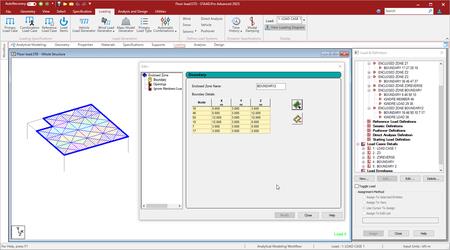
New User Report System
The standard output file created during an analysis is often formatted by engineers to contain the key data to use as a report on their analysis. However, there are many times when a report needs to be created after the fact and creating a customised User Report has been provided in STAAD.Pro. Whilst popular, it has been found to have a number of technical challenges that didn't provide the flexibility many engineers are looking for, so this capability has been reconstructed from the ground up. Providing the same range of capabilities that was available with the older User Report, but now built on a database platform which means that this will allow far greater customisation than ever before.

Individual tables can be customised:-
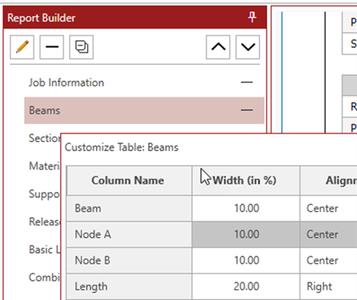
Once created, reports can be saved as templates which can be shared between projects and team members, not just locked to a single model. Reports can be exported now to MS Word (*.docx), MS Excel(*.xlsx), or a generic PDF. By being stored in a database, opportunities now exist for being more proactive in the content by using third party tools such as SQLite.
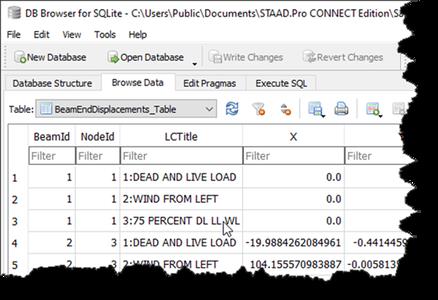
New Profile Database System
One of the big challenges for STAAD users in the past has been the controlled ecosystem that was employed in the use of the database system provided for obtaining the section properties of profiles defined in commonly referred to publications. Whilst this works well for the databases that were distributed with the program, it was difficult to expand and customise them to reflect specific organisations or projects. The STAAD.Pro code base was restricted to support a limited set of countries/manufacturers. Any customisation that was required, had to be done at the expense of one of the databases that was included in the installation. STAAD.Pro has such a vast userbase who have models that are dependent on this system of defining profiles, it was determined that it will remain but now referred to as the 'Legacy Database', and a new system has been added to overcome many of these limitations. The new 'Standard Databases' are flexible to allow new databases to be created, shared and employed without having to redefine the existing database assignments which restricted that ability of engineers to add a new set of profiles for a project. They are built on a standard SQL format of tables. A master table that defines the data that will be supplied including the profile shape of the table (* this initial release will focus on a number of standard shapes, more shapes will be added in future post and vote on the Ideas portal for your preferred shapes to add) and for each table of data, a second that defines what data the various columns represent including the units. Tools have also been added to allow databases to be created by importing a spreadsheet or adding a table to an existing database by picking data from a spreadsheet.
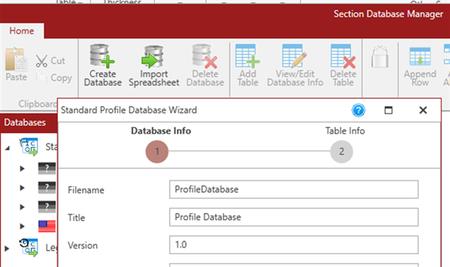
Any database used to define properties can then be shared amongst a team and different databases can be setup for different projects

By setting this to a central location, teams can work efficiently by all working using a single instance of the database that can be managed by a team administrator:-
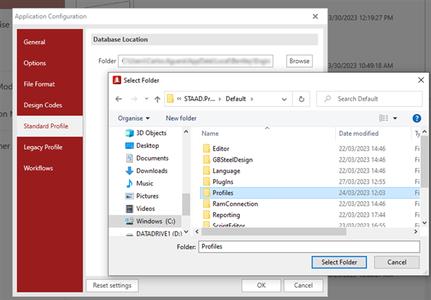
Chinese Performance Steel Design
The design of structures by engineers in China need to change depending on the type of structure and the magnitude of seismic it needs to account for. For larger seismic events (i.e., Fortified), then the engineer needs to use the Performance Design method which is defined in GB50017-2017, chapter 17. This is required for the designs of residential and industrial buildings, with this release functionality has been added for provide the requirements for the design of residential buildings.

Chinese Wind Loading *
The wind loading routine provided for definitions to the Chinese wind load GB5009, has been updated to provide an option to create the list of members that define each of the four faces by selecting them graphically. Additionally, when using the Group definition to specify the beams on each face, then the beams associated with the group are highlighted when the structure face is selected in the table.

* Note, this modification was added in STAAD.Pro V22 U10, but not reported
Working with ADINA
Many projects require a standard structural analysis as provided by STAAD.Pro but occasionally, and growing in occurrence, a more complex analysis method which is currently not provided by STAAD.Pro may be required such as transient dynamic or a collapse analysis. This capability is available to engineers with the Adina application which was recently acquired by Bentley. However, with a different data format, creating a duplicate of he model can be a tie consuming operation. So a new export option has been provided allowing the model data to be generated in the Adina .IN format ready for applying loads and analysis methods as needed.

Minor Enhancements
Updated Editor
The Editor has been updated to improve the user experience, with a new default colour for text by providing new colour settings, "Find Text match Highlight Colour" and "Find Text Scope Highlight Colour". Additionally, the file type settings dialog has been improved.

STAAD.Pro
The following identifies the new features and enhancements that have been added in STAAD.Pro 2023. These features have been selected to allow STAAD.Pro to deliver a greater range of capabilities required by engineers around the world.
Improved Reports
- An entirely new workflow for generating reports of STAAD.Pro models, analysis, and design has been added. More advanced formatting and filtering of report contents is now possible. Reports can also be quickly exported to PDF as well as Microsoft Office documents and spreadsheets.
- Report formatting and contents can be saved as a re-usable template which can be reused for other models and shared with others in your organization.
New Section Database
- A new section database format has been added which more readily supports the addition of custom shape databases.
- Several country's databases are currently available for use in the new "standard" database format. Older shape databases are still supported as the "legacy" database format.
Enclosed Zone Loading
- A new load type definition is available in STAAD.Pro. You can now define an enclosed area of members for applying a perpendicular area load. Openings in the enclosed zone can be added. Additionally, you can control which members within the enclosed zone contribute to load transfer or the formation of the zone boundary.
Export to ADINA
- In the event that a structural model requires analysis capabilities that STAAD.Pro does not offer but are available in ADINA, you can now easily export your model to an ADINA IN file.
RCDC
The following identifies the new features and enhancements that have been added in the CONNECT Edition V11 Update 5 of RCDC, which is installed with STAAD.Pro.
RCDC 2023
1. Beam Crack-width check for corner Rebar - Indian code - Performing crack-width at the corner and side face of the beam.
For the beam design, RCDC was performing the crack-width check at the bottom or top edge of the beam. RCDC will now consider the corner rebar for which crack width is performed at the corner and side face of the beam. The choice is given to the user to perform the crack-width check at these new locations. This is applicable to the Indian code only
2. Australian Concrete design code AS 3600:2018 - New check added for Minimum percentage reinforcement in the column based on axial load.
Presently, RCDC maintains the minimum percentage of longitudinal reinforcement as per the user-defined percentage value given on the design setting screen. A new check is now available to provide the minimum percentage of longitudinal reinforcement as per clauses 10.7.1 (a) and 8.1.6.1 of AS 3600:2018. After selecting a new check, the minimum percentage of longitudinal reinforcement is calculated for the maximum of the following,
a. Pt defined by the user.
b. Pt calculated as per clauses 10.7.1 (a) and 8.1.6.1.
If the axial load on the column is more than the value 0.1f'cAg where f'c is the characteristic compressive strength of concrete and Ag is the gross cross-section area of the column, the minimum area of longitudinal reinforcement is calculated as per clause 10.7.1 (a). In the other case, the minimum area of longitudinal reinforcement is calculated as per clause 8.1.6.1.
3. Addition of 6 & 9 mm rebars in ACI (metric) and NSCP codes.
New 6 and 9 mm rebars are now available in the column and beam modules of ACI Metric and NSCP design code. The purpose of adding 6 and 9 mm rebars is to optimize the quantity of the shear reinforcement using lesser rebar diameters satisfying the design code requirements. New diameters are available only if the user selects the Rebar diameter option on the reinforcement settings screen.
4. Beam flexural calculation enhancement - ACI and NSCP codes.
The maximum permissible percentage reinforcement in the beam module is now restricted as per the tension-controlled section. The maximum percentage reinforcement is calculated as per the minimum tension-controlled strain limits given in the design codes. If the percentage reinforcement required for the flexural design is more than the user-defined maximum percentage reinforcement and percentage reinforcement calculated for the tension-controlled section, then the section is qualified as a failed in maximum percentage reinforcement.
5. Load Type reading for load cases from STAAD.
RCDC will now directly fetch the load case type defined in the STAAD analysis file. When the user reads the STAAD analysis file and opens the Basic load case screen, RCDC will auto-fill the load type column. Users can proceed with the auto-identified load case type or change the type as per design requirements and proceed further.
STAAD Foundation Advanced
The following identifies the new features and enhancements that have been added in the CONNECT Edition V9 Update 7.1 of STAAD Foundation Advanced, which is installed with STAAD.Pro.
CONNECT Edition V9 Update 7.2
1. Combined footing:
- Improvements in the methods used in finding an optimal footing size that satisfies bearing pressure checks and loss of contact limits.
- Better estimation of the maximum bending moments and shear forces in out-of-contact situations
- More economical footing sizes resulting from the above.
- Messages in the output pane that give a detailed insight into the checks performed by the program at the various stages for each load case
2. Machine foundations:
- A more rigorous implementation of the equations of ACI 351.3R-04 for soil damping constants and soil stiffness coefficients per the "Richart and Whitman" method and the Veletsos method
- Improvements in the calculation report to reflect the appropriate code equations for the computation of the above and the performance criteria of the machine
3. PLANT mode - Tank foundations and Vertical Vessel foundations:
- Correction of errors involving loads on the ringwall/foundation due to wind and seismic forces
- More detailed reporting of calculation results to allow for easier validation of the processes followed by the program.
- Stricter enforcement of PIP STC01015 rules to ensure that load combinations that were not intended cannot be applied in the model
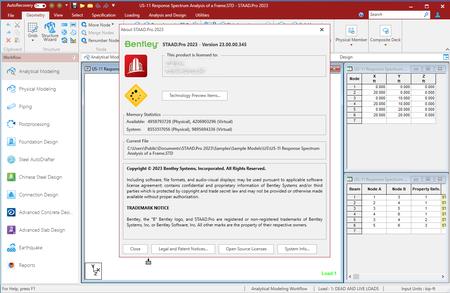
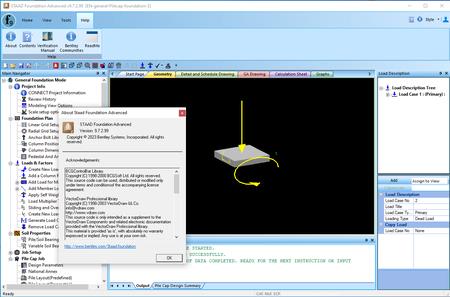
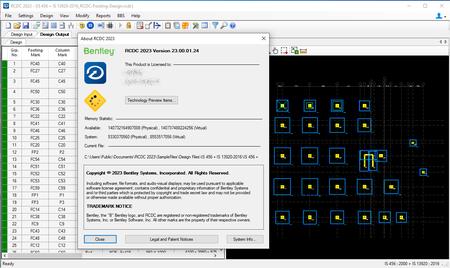
STAAD.Prois the most popular structural engineering software product for 3D model generation, analysis and multi-material design. It has an intuitive, user-friendly graphical user interface, visualization tools, powerful analysis and design facilities and seamless integration to several other modeling and design software products. The software is fully compatible with supported Windows operating systems. For static or dynamic analysis of bridges, containment structures, embedded structures (tunnels and culverts), pipe racks, steel, concrete, aluminum or timber buildings, transmission towers, stadiums or any other simple or complex structure, STAAD.Pro has been the choice of design professionals around the world for their specific analysis needs.
STAAD.Pro 2023 - New Release
In this video, you will learn about the exciting new features now available in STAAD.Pro 2023.
Bentley Systems, Incorporated.is the global leader dedicated to providing architects, engineers, constructors, and owner-operators with comprehensive architecture and engineering software solutions for sustaining infrastructure. Founded in 1984, Bentley has nearly 3,000 colleagues in more than 45 countries, $500 million in annual revenues, and, since 2001, has invested more than $1 billion in research, development, and acquisitions.
STAAD.Pro 2023 (23.00.00.345)
RCDC 2023 (23.00.01.024)
iTwin Analytical Synchronizer 2023 Update 1 (23.01.00.119)
STAAD Foundation Advanced V9 Update 7.2 (09.07.02.099)
Buy Premium From My Links To Get Resumable Support,Max Speed & Support Me
Rapidgator-->Click Link PeepLink Below Here Contains Rapidgator
http://peeplink.in/3fee3afb16e4
PeepLink Password: 123
Uploadgig
rplki.setup.rar
NitroFlare
rplki.setup.rar
STAAD.Pro 2023 (23.00.00.345) Win x64 Torrent Download , STAAD.Pro 2023 (23.00.00.345) Win x64 Crack Download , STAAD.Pro 2023 (23.00.00.345) Win x64 Patch Download , STAAD.Pro 2023 (23.00.00.345) Win x64 Serial Keygen Download
Free Download STAAD.Pro 2023 (23.00.00.345) Win x64 is known for its high-speed downloads. It uses multiple file hosting services such as Rapidgator.net, Nitroflare.com, Uploadgig.com, and Mediafire.com to host its files